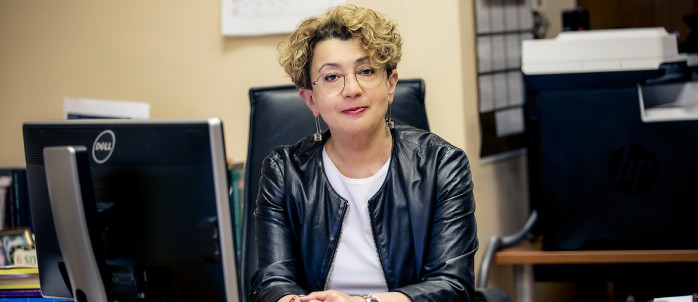
Lithuanian Jewish Community chairwoman Faina Kukliansky said 2015 was an important year for the Community and that she is hoping for changes in school curricula in 2016 to take into account the Jewish contributions to Lithuanian history, Jewish culture and the Holocaust.
The year 2015 was an important one for us, the community. Important changes in Lithuanian-Israeli relations were seen. An Israeli embassy was opened in Lithuania and ambassador Amir Maimon began work here. Ambassador Maimon has dedicated a lot of time to the Jewish community and has proven a reliable partner in solving various problems. Lithuanian president Dalia Grybauskaitė and prime minister Algirdas Butkevičius paid serious attention to the Jewish community and both visited Israel in 2015 and met with top leaders of the Jewish state. It was said Israeli-Lithuanian relations have never been so good and efforts to expand economic and cultural ties continue.
The Lithuanian state began to pay more attention to preserving Jewish heritage and cemeteries. Old synagogues left in small towns without any Jews were the subject of utilization agreements with local municipalities to be used for cultural uses by the public. The Lithuanian National Martynas Mažvydas Library began a significant project to digitize the archive of YIVO, which operated in Vilnius until World War II, together with the YIVO institute now located in the USA.
The Lithuanian Jewish Community appreciates that representatives of our Community are included in state visits by top leaders. This is very important to us. I took part in almost all meetings, and this fact testifies not only to the respect shown the Community, but also to the opportunity to present information first-hand, which is important to the leader as well as the Community. We are taking a successful part at all international organizations and continue our many years of cooperation with the Joint Distribution Committee, and appreciate this global organization’s support for our Community. We also thank the ORT, EJC, WJC, AJC, the Goodwill Fund, the Lithuanian Human Rights Monitoring Institute, EEA Grants and the Howard Margolis Foundation for their help. Thank you all.
Currently I am seriously reviewing the operating rules of the Community’s Social Center. We have established a steering committee for the Social Center and are seeking to expand the circle of people eligible to receive social benefits, which should go not only to support the elderly, but more to children as well. Jews are also concerned that people evacuated during the war do not enjoy equal status with deportees. After all, they didn’t leave their homes voluntarily, but receive no pensions from the state.
We should not forget that last year saw the establishment of three governmental commissions. The first was the Commission for Teaching and Holocaust Education. The goal of this commission is to place greater emphasis in the schools on Jewish history and Jewish contributions to Lithuanian history. The second is the Heritage Commission which is tasked with taking care of cemeteries and mass murder sites as well as all surviving Jewish heritage sites in Lithuania. The third commission is for the restoration of property rights to private individuals who did not have Lithuanian citizenship during the period when the law for such restitution was in force. This issue will require negotiations with the Government. Another issue is a decision on non-inherited property which will never be inherited because it belonged to people murdered in the Holocaust. The program approved by the Government back in 2011 to rename the streets of Lithuanian cities and towns in honor of rescuers of Jews and famous Jewish figures, unfortunately, still hasn’t been implemented.
After the brutal terrorist attacks in Europe last year which shook the entire continent, we also hope the issue of the safety and security of members of the Lithuanian Jewish Community will receive more attention from state institutions.
The Šnipiškės cemetery and the cemetery on Olandų street were the subject of much discussion, but I’d like to say that all issues connected with the Šnipiškės cemetery are being and will be solved under supervision by rabbis, and an agreement was signed with the rabbis in 2009. We thank mayor of Vilnius Remigijus Šimašius and director of the Pavilniai Regional Park Vida Petiukonienė, among others, for their concern with and care of the Olandų street cemetery.
We consider ourselves Europeans but to make our Jewish identity real we still have to renew our knowledge of Judaism. This year we bade farewell to our rabbi whose employment contract ended. We intensively conducted a search for a new rabbi from among many candidates, the successors to the Gaon, who wanted to begin working in Vilnius and Lithuania, to continue the Judaic Mitnaged tradition in this country, to work not just at the Choral Synagogue in Vilnius, but also in the community.
I am pleased that the number of Vilnius residents joining the Community is quickly growing. Although we have always said that all Jews living in Vilnius are members of the Community, today we see them becoming true members and paying membership fees, which have been greatly reduced. And non-Jews are also taking part in the Community’s work, and just as we ask for tolerance for others, we strive to be tolerant people ourselves.
The Community is hoping for more participation by the youth because we are not just elderly people. Taking a more active part means each individual may contribute according to their desire, talent and ability. If an individual wants to preserve his or her Jewish identity and those of his or her children and grandchildren, we welcome any and all such initiatives.

